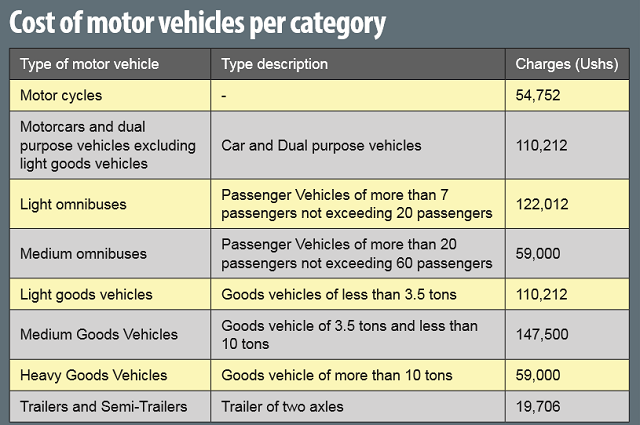
Tough questions, unconvincing answers
The poor reception of the exercise so far, raises pertinent questions about the whole exercise. Is the inspection exercise of any value when one takes personal responsibility to repair their vehicle? Is the cost involved fair? How come only two inspection centres are operational? Why would a vehicle that drives on bad roads for a year get inspected only once? How efficient would the implementation of such policy be given that 80% of the motor vehicles on the market are many years old and prone to breaking down?
Why should people pay for vehicle inspection when the government has not fixed the bad road network that damages vehicles?
How come the bidding process for this exercise was done in 2009 and SGS started the exercise eight years later? And, why give the contract to a private company to take 90% of revenue yet previously the same process was conducted by Uganda’s police unit. In neighboring Kenya, vehicle inspection is conducted by a government agency; the National Transport Safety Authority, at far lower rates than the private sector.
These questions have made a section of the public to doubt the credibility of the exercise and reinforce a belief that it is somewhat designed to benefit people holding juicy positions in the private sector and government.
“Government should pay for this inspection,” Vincent Abyoola, a vehicle owner told The Independent at the Namboole based inspection centre on March 24. “We are already paying a lot of money to own cars in this country….fuel, spare parts, servicing, insurance…all these are making it costly to own a car in Uganda,” he said.
A group headed by Andrew Karamagi, a lawyer is engaging courts seeking to halt the exercise. They argue that by giving out the contract to a private company (SGS), the government is abdicating duties supposed to be implemented by agencies like Uganda National Bureau of Standards and Uganda Police Force.
But Minister Ntege says the issues being raised by those against the exercise weigh less than protecting people’s lives on the road.
“The inspection will keep you alert to ensure that your vehicle is in good condition,” Ntege says and warns motor vehicle owners of impending penalties for anyone apprehended for not testing their vehicles. She said that the legal framework is already in place. According to her, the costs involved are meant to enable SGS to efficiently run the exercise since the government lacks the resources to fund everything.
“They (SGS) have procured very expensive equipment, are buying land which they are using for the exercise,” she said, “They must recoup that money by charging vehicle owners.”
Minister Ntege’s claims are possibly only partially correct. At Namboole, the SGS inspection is taking place in the parking space of Mandela National Stadium which is government property.
A source said that going by bigger numbers of undisclosed motor vehicles in the country, at current rates, the exercise might yield close to Shs200 billion per year. SGS stands to make good business out of the process. This money is far higher than the budgets of many government departments. Some analysts say government should have conducted this exercise on its own so as to raise more revenue to fund priorities of government. For example, the government recently postponed the Local Council elections claiming it lacks Shs16 billion to conduct them.
While responding to general queries about the exercise, Ronald Amanyire, the National Road Safety Council Secretary, a government agency responsible for monitoring the exercise told The Independent that the public concerns regarding the exercise are understandable given that periodic inspection has not been carried out in this country for almost 20 years.
“Vehicle owners are strongly encouraged to take personal responsibility to repair their vehicles but this does not mean the work done during repair is satisfactory,” Amanyire said, adding periodic inspection will ensure that this repair work is certified by government through SGS to protect other road users.”
He said the costs involved in the exercise are comparable to other countries where this kind of inspection is conducted with similar equipment.
Amanyire added that the issue of framing the programme for making money by particular players does not arise because SGS through international competitive bidding won the contract way back in 2009. He listed the five companies that lost to SGS through bidding: Dalei Group, Applus Technologies Inc, Systech International LLC, Mecanique (FAL Group) Holdings SAL (a consortium of Mecanique (FAL Group) Holding SAL (Lebanon), Controle Technique Automobile (Belgium and Autosecurite (Belgium) and Environmental Systems Products Holdings Inc. (ESP).
In addition to mandatory inspection, Amanyire said government will establish a system of joint enforcement with police to conduct roadside inspections of items like brakes, alignment and headlamps to further enhance compliance. It is not clear whether vehicles belonging to government departments, including the police, which are usually in rickety form, will be handled the same way like the ones belonging to private people and other bodies.
Amanyire said, going forward, the government will also have a credible vehicle database and theft of vehicles will be reduced as all vehicle parts like engines and chassis will not continuously change hands with this system in place. Other benefits include employment opportunities by SGS and improvement of vehicle repair skills and facilities leading to indirect creation of jobs.
While defending SGS’s capacity to efficiently conduct the exercise, Christophe Dubois, the country manager, SGS Uganda said they are a provider of automotive services to various governments, dealers, financial institutions and insurance companies across the globe.
For this particular exercise, he said that they have timelines in place for every station and they expect the ones in Nabbingo and Namulanda to be operational in May.
“The rest of the stations in the other parts of the country will be up and running very soon,” Dubois said.
Experts and motor vehicle dealers have welcomed the exercise but urge implementers to ensure that ultimate beneficiaries get value for their money.
“Yes it is an added cost to driving but it will protect all of us driving and walking on the road,” Gilbert Wavamuno, the director in charge of sales at Spear Motors Limited told The Independent on March 24. Wavamuno said the inspection exercise will provide minimum standards for vehicles to be on the road and will eliminate those that are in poor mechanical conditions that make Uganda one of the countries with high road accidents in the world. Over 200,000 road/traffic accident victims involving deaths cases are recorded every year in Uganda according to Uganda Police Force.
****
editor@independent.co.ug
 The Independent Uganda: You get the Truth we Pay the Price
The Independent Uganda: You get the Truth we Pay the Price




How many commercial vehicles can a persin avail in day e. g if the company has a large fleet?